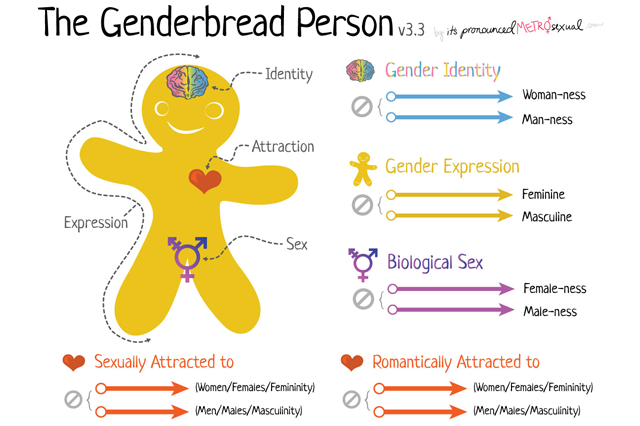Sexuality and Gender Identity Counselling. Our sexuality is multi-faceted and more fluid than many people realize. This can be confusing and unsettling. Questions about sexuality are often hard to bring up for fear of being shamed. That is why talking about these concerns in a safe, confidential setting can make such a difference.

What Does Sexuality and Gender Identity Look Like?
Most of us were brought up at an early age to believe that as far as biological sexual identity goes, there’s only the binary: boy or girl. This example becomes integrated into our lives, through media, toys, clothing, etc. This can lead to much confusion when trying to figure out your place in the world.
Additionally, we also live in a culture that uses “gender” and “sex” interchangeably. However, one’s sexuality and identity are actually two separate entities. You may be struggling to understand how different people think and understand the various facets that makeup how we think about gender. Perhaps you are coming to realize that there are many ways to look at these aspects of identity. One way to simplify the many components of gender identity, gender expression, sexuality, and biological sex is by using the Genderbread Person model above, created and illustrated by Sam Killerman, author and LGBT advocate.
Liz can help you navigate through these components with sexuality gender identity counselling.
Clues or Indicators of Sexuality and Gender Identity Struggles
It may be questions about orientation, or about whether you felt a sense of self matches your body, and how clear you are on these concerns. There are many healthy variations on sexuality and you deserve a safe place to sort this out for yourself. These may be some of the personal or social hurdles you are dealing with;
- issues with social acceptance,
- interpersonal issues due to lack of acceptance from friends, family, colleagues,
- depression, grief, anger, or anxiety,
- difficulty accepting their true self,
- fear of behaving like one’s true self,
- or discomfort with one’s physical sex/form.
When Should I Seek Sexuality Gender Identity Counselling?
If you are struggling with your identity, Liz believes talking about these concerns in a safe, confidential setting can make a difference.
When whatever you try does not make a lasting change, when the feedback does not shift that is a sign more is needed. It’s time to do the hardest thing of all, it is time to reach out and find ways over, under, around or through the struggle. And the right therapist can do that with you.
- Coping with discrimination and oppression,
- support in coming out to one’s family,and friends,
- help sorting out an “authentic” sense of self,
- facing social expectations and pressures,
- or feeling higher levels of depression, anxiety.
How Will Counselling Help Me?
Liz is an active member of the Pride Senior group. She has the experience and familiarity with the challenges members of the LGBTQIA community often face. When seeking sexuality and or gender identity counselling, whether for sexual, romantic, or gender identity or for concerns related to mental health, choosing a counsellor can be critical to a successful outcome.
Talking about struggles is the oldest known form of getting help known to humankind. We also know there are specific skills that make a difference over a longer time, and that is how therapy can help. Challenging our negative thoughts, finding meaning in the meaningless with someone who can be a guide makes a real difference. And using skills to actually end the struggles with the awful stuff frees up energy for a life with more possibilities.
Working With Liz

Liz is a registered psychologist in Edmonton, who began her career as a clinical social worker. Liz Massiah considers the impact with social, cultural, familial economic, educational, and other influences. As well as the more individually focused work of psychology to her therapy practice.
Liz has practiced since 1983 here in Alberta.
Read More